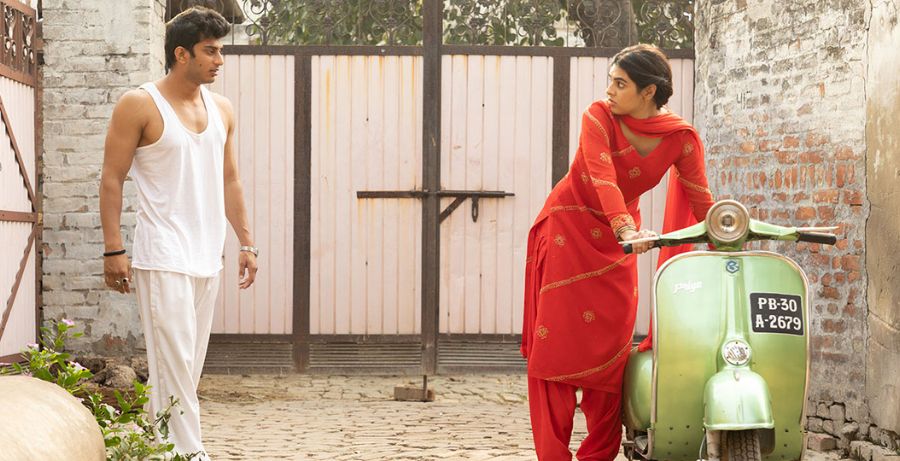Tarsem Singh Dhandwar’s Dear Jassi, his first feature in eight years, is a doomed love story that captures Punjab like never before, affording its lush fields a rare grace and solemn beauty. Dhandwar is no stranger to stylistic extravagance, helming projects like The Cell, The Fall, and Immortals, but with this new effort, he returns to the country of his birth with his most unadorned and powerful film to date.
The region of Punjab is one that’s both breathtaking to behold and historically fraught. Its painterly landscape has been the site of unimaginable violence, both cultural and political. Its name is derived from the five rivers that flow through it, but for decades, they haven’t shared the same nation, reeling from religious and national divides that are still alive and well today. As a result, it’s the Indian state that has seen the greatest exodus, with its predominantly Sikh community calling countries like Canada their new home, albeit never fully relinquishing their ties to the homeland—a quality that manifests in pleasant and deeply harrowing ways.
Dear Jassi is bookended by renowned Punjabi singer Kanwar Grewal, who mournfully introduces the tale as a love story. He lends it the timbre of an ageless folktale—one that has been passed down for generations. Yet, it’s made infinitely more heartbreaking by its basis in fact, as the tragic true story that inspired the film took place not long ago at all, in the mid to late 90s.
The Romeo and Juliet of this story are Mithu (Yugam Sood) and Jassi (Pavia Sidhu) who practically fall in love at first sight at a local game of Kabaddi. He’s a lower caste Rickshaw driver and she’s the daughter of a wealthy family that has relocated to Canada. Despite their vastly different stations, the two forge an instant, unspoken connection, exchanging stares and longing glances until Jassi admits she wants to be with him forever. Unfortunately, she must return to her strict home in British Columbia. From there, the film sweetly and elegiacally traces their eternal bond through years of love letters, crackly phone calls, and a secret marriage. Their relationship is one that hangs on by a thread but is no less moving because of it.

It’s not hard to find yourself caught in their passionate tide of forbidden love, yearning for them to be together despite knowing how it will tragically end. The romance at the heart of Dear Jassi might sound saccharine and unbelievable if it weren’t true, as the film painfully reminds us that it’s one of many such stories that have unfolded across the subcontinent, and the world for that matter.
Dhandwar and his cinematographer, Brendan Galvin, frame the story in sweeping, majestic pans that capture the picturesque stillness of Punjab’s countryside and the sprawling, imposing web of its urban centres—both of which pose grave obstacles that keep the two apart. Dhandwar employs a form of cyclical camerawork and editing that is lyrical to say the least, beautifully reinforcing the threadbare connection that remains between them as they are forced to continue their lives, oceans apart from each other until they can be together. All these choices sumptuously coalesce to cement Dear Jassi as arguably the most gorgeous film of the year.
Dhandwar’s decision to have his first Indian feature unfold in his mother tongue is impactful and renders it that much more authentic and resonant. Jassi’s broken Punjabi perfectly complements Mithu’s shaky grasp of English, almost as if their much different worlds were meant to collide. It’s not hard to find yourself smiling on impulse when Mithu mispronounces words like “love you” (Laab Ju) and “Pizza” (Pijja).
Sidhu and first-time performer Sood bring forward compelling, natural performances that go a long way in keeping the heightened emotional states of their characters believable. They work in tandem to keep us immersed in their blinkered lovesick world, one that’s too pure and naïve to truly last.
The film gives way to a visceral, impeccably staged third act, one that doesn’t shy away from depicting the truth with uncensored brutality. Dear Jassi’s power lies in how it gives viewers a glimpse of another, hopeful possibility and then ruthlessly destroys it. Dhandwar crafts both a prescient, pensive ode to Jassi and an indictment of the traditions, customs, and corrupt systems that allow such tragedies to unfold, time and time again. It’s a rare look at how a misguided vision of honour can render an act so natural as love a disgrace—a message that has yet to fully resonate in the verdant plains of Punjab.
Dear Jassi screened as part of the 2023 Toronto International Film Festival.
Dear Jassi
-
Rating - 9/109/10
TL;DR
Dear Jassi’s power lies in how it gives viewers a glimpse of another, hopeful possibility and then ruthlessly destroys it.







